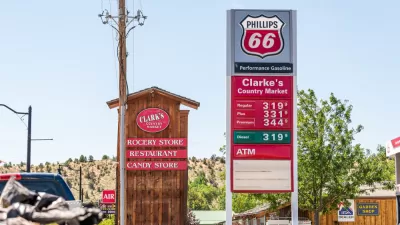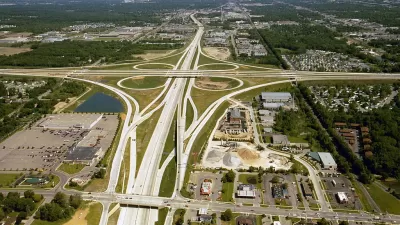Over the next decade, $1 billion will be spent to repair the state's deteriorating roads. Like many states unwilling to raise gas taxes, most will come from transfers from the general fund, though $41.4 million per year will be from car sales taxes.
Adam Beam writes that the two contentious aspects of South Carolina's new transportation bill are that it relies heavily on borrowing and that the amount is insufficient to address the state's transportation needs. In fact, the bill was written by state Senate Minority Leader Nikki Setzler, D-Lexington, as many of the governor's fellow Republicans objected to the borrowing.
The bill allows the Transportation Department to transfer $50 million per year of state surplus funds to the State Infrastructure Bank "to borrow at least $500 million to repair interstates and primary roads." The $41.4 million per year to repair secondary roads would come from reallocating half the state's auto sales tax revenue. "An additional transfer of $50 million in one-time money to repair bridges" would be used to accept up to $250 million in federal funds.
Beam writes that according to the state transportation officials, there will be a $29 billion deficit to address road repairs over the next 20 years. Business groups had been lobbying strongly for increased road funding.
The passage of the bill is significant. Two years ago the state's DOT was in dire financial straits and "had to turn to the federal government for its cash flow problem", as noted here.
Also in The State, Associated Press reporter Jeffrey Collins writes that the 16-cents a gallon state gas tax hasn't been raised since 1987. According to the Tax Foundation, the state has the 47th lowest gas tax in the U.S., though they will be #48 after July 1.
Wyoming, another red state with a 14-cent gas tax, will see a 10-cent increase after Gov. Matt Mead signed legislation last February. Upon signing, he stated that "... the state can no longer afford to subsidize the transportation department from general funds." Like South Carolina's business community, he noted that "the state's highway system is vital to economic development."
FULL STORY: SC Gov. Haley signs $1 billion roads bill

Planetizen Federal Action Tracker
A weekly monitor of how Trump’s orders and actions are impacting planners and planning in America.

Restaurant Patios Were a Pandemic Win — Why Were They so Hard to Keep?
Social distancing requirements and changes in travel patterns prompted cities to pilot new uses for street and sidewalk space. Then it got complicated.

Map: Where Senate Republicans Want to Sell Your Public Lands
For public land advocates, the Senate Republicans’ proposal to sell millions of acres of public land in the West is “the biggest fight of their careers.”

Maui's Vacation Rental Debate Turns Ugly
Verbal attacks, misinformation campaigns and fistfights plague a high-stakes debate to convert thousands of vacation rentals into long-term housing.

San Francisco Suspends Traffic Calming Amidst Record Deaths
Citing “a challenging fiscal landscape,” the city will cease the program on the heels of 42 traffic deaths, including 24 pedestrians.

California Homeless Arrests, Citations Spike After Ruling
An investigation reveals that anti-homeless actions increased up to 500% after Grants Pass v. Johnson — even in cities claiming no policy change.
Urban Design for Planners 1: Software Tools
This six-course series explores essential urban design concepts using open source software and equips planners with the tools they need to participate fully in the urban design process.
Planning for Universal Design
Learn the tools for implementing Universal Design in planning regulations.
Heyer Gruel & Associates PA
JM Goldson LLC
Custer County Colorado
City of Camden Redevelopment Agency
City of Astoria
Transportation Research & Education Center (TREC) at Portland State University
Camden Redevelopment Agency
City of Claremont
Municipality of Princeton (NJ)





























